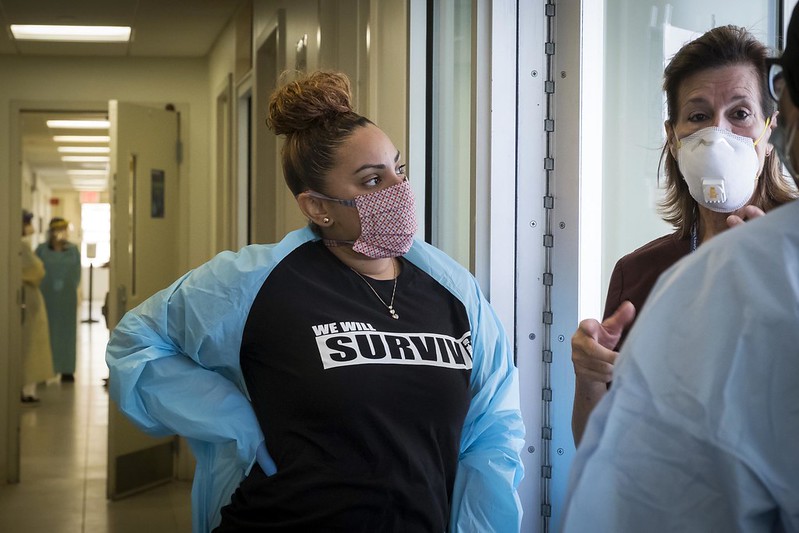
Gotham Health (photo: Ed Reed/Mayor's Office)
On Friday, the New York City Council’s Committee on Higher Education heard from administrators and students of CUNY’s nursing schools to understand how they have maintained student progression despite transitioning to online learning amid the coronavirus pandemic.
CUNY has 14 nursing schools that offer a variety of certificates and associates, bachelors, masters, and doctorate degree programs. An average of 1,800 students graduate every year from CUNY nursing programs, many of whom go off to work in New York City hospitals, nursing homes, and other local settings.
City Council Member Inez Barron, a Brooklyn Democrat who chairs the Council higher education committee, noted at the hearing that given the increasing demand for health-care workers, recent graduates from CUNY nursing programs will be needed as hospitals prepare for a challenging winter amid spiking covid infections and hospitalizations.
Also of particular concern during the hearing was the withdrawal of Lehman College’s accreditation, which has left the careers of 45 Family Nurse Practitioner (FNP) students up in the air. In order to receive accreditation from The Commission on Collegiate Nursing Education (CCNE), schools must have a minimum pass rate of 80% on the National Council Licensure Examination (NCLEX). Lehman College students missed that pass rate by 2% in 2019.
Overall, administrators highlighted CUNY nursing programs’ ability to implement virtual learning methods without, they said, sacrificing the quality of student learning.
CUNY Dean of Health and Human Services Patricia Boyce discussed how students have been able to continue their degrees through online learning opportunities such as simulations, alternative training models, and Interprofessional Education (IPE), a learning method where students can collaborate across health fields.
“We’ve met or exceeded the expectations in terms of student progression” said Boyce. “We have the highest number of graduations in spring 2020, at the height of the pandemic, which I think again demonstrates the perseverance of our students and our ability to maintain their progression in our programs.”
This past spring, 1,879 students graduated from CUNY’s nursing programs, a 60% increase from the number of graduates in 2019.
In place of in-person clinical training, CUNY has provided students with telepractice opportunities and simulations through NYSIM, which is NYU’s and CUNY’s collaborative simulation courses in healthcare. With the exception of some licensing requirements and accelerated programs which require in-person clinical training, most accreditors and all CUNY nursing programs permit students to fulfill their clinical requirements through alternatives to in-person clinical experience.
A major reason students may not have in-person opportunities for clinical training is because of the limited availability of spots at clinical sites. For health and safety reasons, hospitals may limit the capacity of students they accept. “But as soon as the sites let us in,” Boyce said, “we go immediately and fulfill those students' clinical hours.”
Both the administration members and students who testified also discussed racial diversity in CUNY’s nursing programs. Boyce noted that “Approximately 70% of our nursing degree students are people of color,” which she said is a “stark contrast to national norms” where enrollment skews more white.
Chair of the CUNY Student Senate Juvanie Piquant said that despite the overall increase in STEM degrees, Black and Hispanic students remain underrepresented in STEM programs.
“CUNY’s Black and Hispanic students earned 31% of computer science degrees last year while representing 55% of the student body,” she said, citing research from the Center for an Urban Future. Piquant also emphasized that the lack of cultural affirmation, lack of mental health support, and financial and food insecurity amid tuition hikes has made it challenging for nursing students at Lehman college to continue their studies.
Students expressed special concern for the 45 Lehman College nursing students expecting to graduate in January 2021. Expectant graduates found out about the college’s loss of accreditation this past November.
Because Lehman students will be graduating from a non-accredited institution, they will be barred from taking the NCLEX exam for all testing dates in the future and consequently be unable to receive licensure. Although New York is one of three states in the U.S. that allows graduates from non-accredited programs to practice nursing, very few institutions will hire nurses from programs without CCNE approval.
“They're graduating during a pandemic and the city needs more health-care workers, but they can’t practice with their degrees as of now,” said Sumana Ali, Vice President for Academic and Legislative Affairs of the CUNY Student Senate.
Students are also looking to delay graduating in the case that Lehman College will regain accreditation. However, Marina Aminova, who is one of the 45 Lehman College nursing students expected to graduate this month, explained that postponing graduation entails other complications.
“If we postpone in six months people have student loans that they need to begin to pay,” she said. “We spent this money on this degree and now we won't have the income to recoup what we invested.”
Lehman has reached out to CCNE requesting an extension for its accreditation to stand until February. It has also submitted a request to the American Association of Nurse Practitioners (AANP) to see if accreditation by the New York State Education Department (NYSED) is enough to permit students to take the exam. Lehman is expected to receive responses from both institutions this week.
“We lost family members, we experienced dark moments all the while we were still attending school and still completing hundreds upon hundreds of clinical hours needed to graduate in the most impoverished county in this state during the worst pandemic in the century,” said Aminova. “These last years of hard work, sacrifice, time away from spouses, parents, and our children, time away from work, forgone income, paid tuition, tireless studying has all been for nothing.”
***
by Victoria Choe for Gotham Gazette
@GothamGazette




